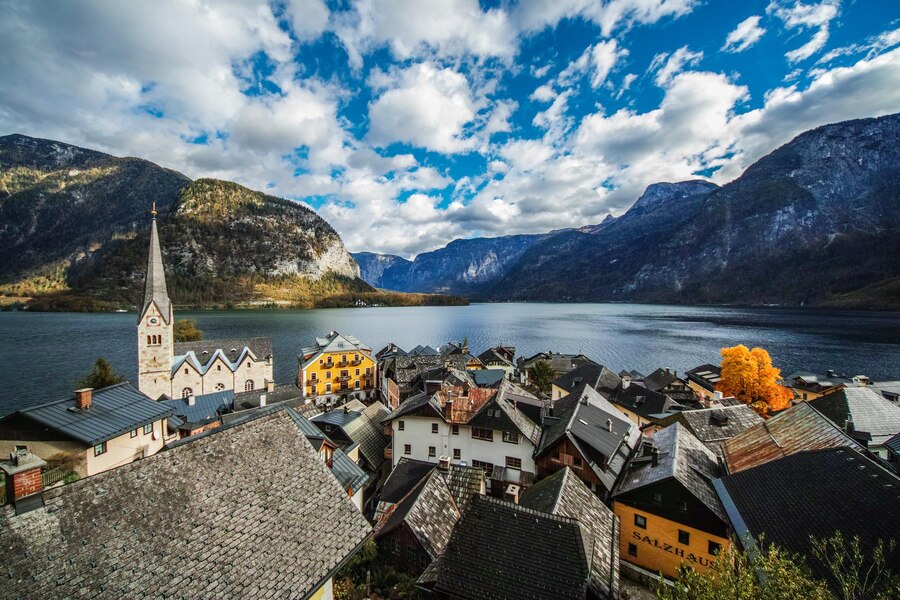In the realm of global mobility, the strength of a nation’s passport plays a crucial role in facilitating international travel, business, and diplomacy. Austria, Finland, Ireland, Luxembourg, Netherlands, South Korea, and Sweden are tied for seventh place in terms of passport strength, each offering its citizens visa-free or visa-on-arrival access to 191 countries. This exceptional level of global access reflects the diplomatic clout and international trust enjoyed by these nations.
Historical Context

Austria
Austria, with its rich history, has been a significant player in European politics and culture. From its days as part of the Austro-Hungarian Empire to its current role as a modern European state, Austria has evolved significantly. Its location in Central Europe has made it a cultural and economic hub, contributing to its strong diplomatic relations and powerful passport.
Finland
Finland’s history is marked by its transition from Swedish and Russian rule to independence in 1917. Known for its commitment to education, technology, and social welfare, Finland has emerged as a leading nation in terms of quality of life and innovation. Its robust international relationships are reflected in the strength of its passport.
Ireland
Ireland, with its rich Celtic heritage and history of British rule, gained independence in 1922. Known for its vibrant culture and strong economy, particularly in technology and pharmaceuticals, Ireland has cultivated extensive international ties. Its strong passport reflects its global standing and economic influence.
Luxembourg
Luxembourg, a small but affluent Grand Duchy in Western Europe, has a unique position in international finance and diplomacy. Despite its size, Luxembourg’s economic strength and active role in European and global affairs contribute to the power of its passport.
Netherlands
The Netherlands has a long history of maritime exploration and trade, which has shaped its international relationships. Known for its progressive policies and economic strength, the Netherlands has consistently been a major player in global affairs, reflected in its powerful passport.
South Korea
South Korea, emerging from the Korean War as a war-torn country, has transformed into a global economic powerhouse. With significant advancements in technology, manufacturing, and entertainment, South Korea’s strong passport reflects its economic success and international influence.
Sweden
Sweden’s history of neutrality and its role as a progressive social welfare state have positioned it as a leader in global diplomacy and humanitarian efforts. Sweden’s commitment to global cooperation and its strong economy contribute to the strength of its passport.
Economic and Diplomatic Strength
Austria
Austria’s economic strength lies in its diverse industries, including finance, manufacturing, and tourism. Vienna, the capital, is a major financial center and a hub for international diplomacy. Austria’s active participation in the European Union and its strategic location contribute to the strength of its passport.

Finland
Finland’s economy is known for its technological advancements, with major contributions in sectors like telecommunications and software. The country’s emphasis on innovation and education, coupled with its active role in international organizations, enhances the strength of its passport.
Ireland
Ireland’s economic success is driven by its robust technology sector, favorable business environment, and significant foreign direct investment. Dublin is a major financial center, and Ireland’s strong trade relationships and international diplomacy bolster the strength of its passport.
Luxembourg
Luxembourg’s economy is centered around finance, technology, and international trade. The country’s financial sector is one of the largest in Europe, and its strategic role in the European Union contributes to its strong diplomatic relations and passport strength.
Netherlands
The Netherlands boasts a highly developed economy with strengths in sectors such as trade, finance, and technology. Its international trade relationships and active role in the EU enhance its global influence, reflected in the strength of its passport.
South Korea
South Korea’s economy is a global leader in technology, automotive, and entertainment sectors. With major multinational corporations and a strong emphasis on innovation, South Korea’s economic power and international diplomacy contribute to its passport strength.
Sweden
Sweden’s economy is characterized by its advanced technology sector, strong social welfare system, and high standard of living. Sweden’s role in international diplomacy and humanitarian efforts, coupled with its economic strength, contributes to the power of its passport.
The Power of the Passport
The passports of Austria, Finland, Ireland, Luxembourg, Netherlands, South KoreaSweden offer their citizens visa-free or visa-on-arrival access to 191 countries. This level of global mobility reflects the trust and respect these countries command internationally.
List of Countries
Here is a list of countries where passport holders from Austria, Finland, Ireland, Luxembourg, Netherlands, South Korea, and Sweden enjoy visa-free or visa-on-arrival access:
| Region | Countries/Regions |
|---|---|
| Africa | Botswana, Cape Verde, Comoros, Eswatini, Gabon, The Gambia, Ghana, Guinea-Bissau, Kenya, Lesotho, Madagascar, Malawi, Mauritania, Mauritius, Mayotte, Morocco, Mozambique, Namibia, Réunion, Rwanda, Senegal, Seychelles, Sierra Leone, Somalia, South Africa, St. Helena, Tanzania, Togo, Uganda, Zambia, Zimbabwe |
| Americas | Antigua and Barbuda, Argentina, Bahamas, Barbados, Belize, Bermuda, Bolivia, Brazil, Canada, Chile, Colombia, Costa Rica, Dominica, Dominican Republic, Ecuador, El Salvador, French Guiana, Grenada, Guatemala, Guyana, Haiti, Honduras, Jamaica, Mexico, Panama, Paraguay, Peru, Saint Kitts and Nevis, Saint Lucia, Saint Vincent and the Grenadines, Suriname, Trinidad and Tobago, United States, Uruguay, Venezuela |
| Asia | Armenia, Bahrain, Bangladesh, Brunei, Cambodia, China, Cyprus, Georgia, Hong Kong, India, Indonesia, Israel, Japan, Jordan, Kazakhstan, Kuwait, Kyrgyzstan, Laos, Lebanon, Macao, Malaysia, Maldives, Mongolia, Myanmar, Nepal, Oman, Pakistan, Palestine, Philippines, Qatar, Saudi Arabia, South Korea, Sri Lanka, Taiwan, Tajikistan, Thailand, Timor-Leste, Turkey, UAE, Uzbekistan, Vietnam |
| Europe | Albania, Andorra, Austria, Belarus, Belgium, Bosnia and Herzegovina, Bulgaria, Croatia, Cyprus, Czech Republic, Denmark, Estonia, Faroe Islands, Finland, France, Georgia, Germany, Greece, Hungary, Iceland, Ireland, Italy, Kosovo, Latvia, Liechtenstein, Lithuania, Luxembourg, Malta, Moldova, Monaco, Montenegro, Netherlands, North Macedonia, Norway, Poland, Portugal, Romania, Russia, San Marino, Serbia, Slovakia, Slovenia, Spain, Sweden, Switzerland, Ukraine, United Kingdom |
| Oceania | Australia, Cook Islands, Fiji, French Polynesia, Kiribati, Marshall Islands, Micronesia, New Caledonia, New Zealand, Niue, Palau, Papua New Guinea, Samoa, Solomon Islands, Tonga, Tuvalu, Vanuatu |
| Others | British Virgin Islands, Falkland Islands, Gibraltar, Greenland, Guadeloupe, Guam, Martinique, Montserrat, Saint Pierre and Miquelon, Turks and Caicos Islands, Western Sahara |
Challenges and Future Prospects
Demographic and Social Challenges
Many of these countries face demographic challenges, including aging populations and declining birth rates. Addressing these issues through policies that encourage higher birth rates, support for families, and immigration of skilled workers will be crucial for maintaining economic stability.
Economic and Technological Advancements
To sustain their economic strength, these nations must continue to innovate and adapt to technological advancements. Investing in digital infrastructure, green technologies, and research and development will be essential for remaining competitive in the global economy.
Environmental Sustainability
As global leaders, these countries are also at the forefront of addressing environmental sustainability. Implementing policies to reduce carbon emissions, promote renewable energy, and enhance environmental conservation efforts will be important for ensuring a sustainable future.
International Relations and Diplomacy
Maintaining strong international relationships and active participation in global organizations will be key to preserving the strength of these passports. Engaging in diplomatic initiatives, fostering international cooperation, and supporting global peace and security efforts will enhance their global influence and passport strength.
Conclusion: Austria, Finland, Ireland, Luxembourg, Netherlands, South Korea, and Sweden, with their powerful passports offering visa-free or visa-on-arrival access to 191 countries, exemplify the strength of their global influence and diplomatic engagement. These countries’ rich histories, economic achievements, and cultural contributions reflect their significant role on the world stage. As they navigate future challenges and opportunities, their continued focus on innovation, sustainability, and international cooperation will ensure continued prominence and influence.
Disclaimer
The information provided in this document is for general informational purposes only.The list of countries offering visa-free or visa-on-arrival access to passport holders from Austria, Finland, Ireland, Luxembourg, Netherlands, South Korea, and Sweden is subject to change based on international agreements and respective countries’ immigration policies.

Get Free Expert Advice: Are you ready to embark on your next adventure? Whether you’re seeking a work permit, tourist visa, or study opportunities in Canada or other countries, we’re here to help! Contact us today to learn how our expert services can simplify your journey and turn your dreams into reality. Reach out now and let’s start planning your future together!
- Canada Citizenship Requirements: Everything You Need to Know
- Canada’s New Visa Rules: What It Means for Indian Students
- Navigating Student Visa Regulations for Studying in the US, UK, Australia, and Canada
Also read:
- Canada’s New Rural and Francophone Immigration Pilots: A Fresh Opportunity for Skilled Workers
- Hundreds of U.S. Visa Appointments Canceled in Colombia: What It Means for Future Travelers
- Ultimate Guide to Dubai Visa Applications for Indian Tourists: Avoid Rejection & Ensure a Hassle-Free Trip with These Key Tips!
- New Canada Immigration Fees Effective December 1, 2024: Everything You Need to Know
- RS Global Immigration Jalandhar: Your Gateway to International Opportunities




